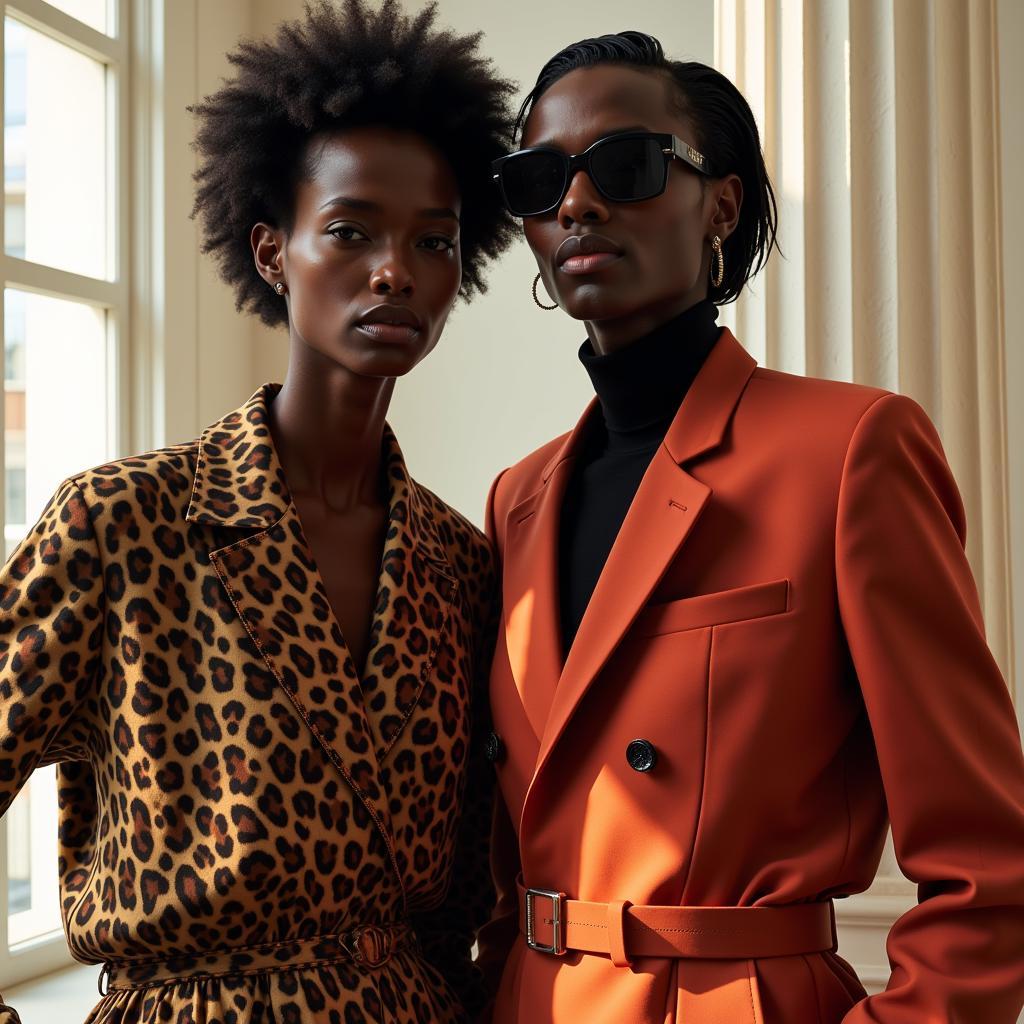African Business Attire: A Guide to Professional Dress Across the Continent
African Business Attire is a vibrant tapestry woven from tradition, modernity, and cultural nuances. From the bustling markets of Accra to the corporate towers of Johannesburg, understanding the appropriate dress code is crucial for navigating the professional landscape of this diverse continent.
Decoding the Dress Code: Navigating African Business Environments
African business attire isn’t a one-size-fits-all concept. It’s influenced by a complex interplay of factors including country, industry, company culture, and even the specific event. While Western-style suits and dresses are common in many urban centers, embracing traditional clothing can be a powerful way to demonstrate respect and cultural sensitivity.
For instance, in countries like Nigeria and Ghana, brightly colored, tailored outfits incorporating traditional fabrics like Ankara or Kente are often seen in professional settings. These garments not only showcase national pride but also reflect a vibrant aesthetic. african american bridal magazine
The Power of Prints and Patterns: Incorporating Traditional Fabrics
African textiles tell stories. From the intricate Adinkra symbols of Ghana to the bold Mudcloth patterns of Mali, these fabrics are rich in cultural significance. Incorporating them into your business attire can be a striking way to express individuality and connect with local traditions. A simple tailored blazer made from Kente cloth or a headwrap fashioned from Ankara fabric can elevate a standard business outfit.
Beyond the Suit and Tie: Embracing Cultural Nuances
While Western business attire has its place, understanding the cultural nuances of African dress is paramount. In some countries, modesty is highly valued, particularly for women. Loose-fitting garments that cover the shoulders and knees are generally preferred. african american clothing retailers offers a great starting point.
What to Wear to a Business Meeting in Africa?
The specifics of what to wear to a business meeting in Africa will depend heavily on the context. However, a good rule of thumb is to err on the side of formality, particularly for initial meetings. A well-tailored suit or dress in neutral colors is always a safe bet. As you become more familiar with the specific company culture, you can begin to incorporate more culturally specific elements into your attire.
Can I Wear Traditional African Clothing to a Business Meeting?
Absolutely! In many African countries, wearing traditional clothing to a business meeting is not only acceptable but also encouraged. It’s a way to show respect for the local culture and build rapport with your colleagues. However, it’s important to choose garments that are professional and appropriate for the setting. Avoid overly casual or revealing attire.
Remember, respecting local customs is crucial.
“Understanding the nuances of African business attire is about more than just following a dress code; it’s about building bridges and showing respect,” says Abena Serwaah, a Ghanaian entrepreneur and fashion consultant.
Accessorizing for Success: The Finishing Touches
Accessories can play a significant role in African business attire. A well-chosen piece of jewelry, a colorful scarf, or a stylish handbag can add a touch of personality and elevate your overall look. african community delhi is a great resource for understanding cultural nuances.
What kind of jewelry is appropriate for African business attire?
Subtle and elegant jewelry is generally preferred in professional settings. A simple necklace, earrings, or a bracelet can complement your outfit without being distracting. In some cultures, specific types of jewelry hold symbolic meaning, so it’s always a good idea to do your research beforehand.
“Accessories are a powerful way to express your individuality while still adhering to professional standards,” says Adebayo Olufemi, a Nigerian fashion designer specializing in corporate attire.
African Business Attire: A Celebration of Diversity
African business attire is a dynamic and evolving reflection of the continent’s rich cultural heritage. It’s a blend of tradition, modernity, and individual expression. By understanding the nuances of dress across different countries and industries, you can navigate the African business landscape with confidence and respect. african fabric london offers a wide selection of traditional African fabrics for those looking to incorporate them into their wardrobe. african jantle man also provides inspiration for menswear.
In conclusion, navigating African business attire requires understanding and appreciating the diverse cultural influences that shape professional dress across the continent. By embracing these nuances, you can demonstrate respect, build relationships, and ultimately achieve success in the African business world.
FAQ
- What is the general dress code for business meetings in Africa? Formal attire, such as suits or dresses, is generally recommended.
- Is it appropriate to wear traditional African clothing to a business meeting? Yes, in many cases it is encouraged as a sign of respect.
- What kind of accessories are appropriate? Subtle and elegant jewelry is generally preferred.
- Are there any cultural considerations regarding modesty? Yes, modesty is highly valued in many African cultures.
- Where can I find more information about African business attire? Resources like online articles, cultural guides, and fashion consultants can provide valuable insights.
- How can I adapt my Western business attire to be more culturally sensitive in Africa? Incorporate traditional fabrics or accessories while respecting modesty guidelines.
- What should I do if I am unsure about the appropriate dress code for a specific event? It is always best to err on the side of formality or inquire with the host or colleagues.
For further assistance with African business attire, please contact us at Phone: +255768904061, Email: kaka.mag@gmail.com or visit our office at Mbarali DC Mawindi, Kangaga, Tanzania. Our customer service team is available 24/7. We also encourage you to explore other related articles on our website for more in-depth information on various aspects of African culture and life.

